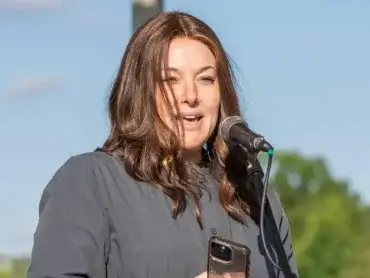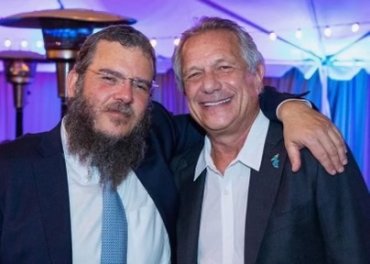This Holocaust Survivor Fed Others As He Was Starving
Who could look up at the sky in the midst of the hells of Auschwitz and take a moment to thank God for its beauty? A 13 boy named Andrew Burian who was raised in an affluent, modern Orthodox home in Bustina, which was then part of Czechoslovakia (now Ukraine). Andrew’s childhood was idyllic. His world was filled with loving family: cousin, aunts, and uncles made up his neighbors, as did both sets of grandparents, who were also well to do (one set even had a movie theater in their home!).
Andrew’s parents pushed him to excel in school, taught him a love of Torah and mitzvos, and doted on him. His mother was a master culinary artist, who would create her delicacies literally from scratch: making cheese from the milk of their cow, oil from the safflowers which grew on their land, etc. Shabbos and holidays for Andrew, growing up in this world, were full of physical and spiritual delight. But then things changed.
Life slowly got worse for Andrew’s family as Nazi influence began to spread. Just after his bar mitzvah, his family was rounded up sent to a Hungarian ghetto and then to Auschwitz-Birkenau via cattle car. Upon arriving in Auschwitz, a prisoner whose job it was to remove dead bodies from the train, greeted his family with a terrifying message: the smoke they saw above them were human beings burning. His mother, grandfather and several other family members were immediately sent to the gas chambers. Andrew was sent with them too, but lost them in the confusion, and instead of continuing in their direction, he went the other way to reconnect with his father and brother, somehow undetected by the Nazi guards. This was one of the many fortuitous moves he made throughout those bleak days which saved his life.
Though he was with his father and brother for some time, eventually they were sent to a labor camp, leaving young Andrew to survive on his own. His father had three parting instructions for him: “Stay clean” (i.e. first and foremost, guard your health as the Torah commands), “be a mentsch and do not to let them make an animal out of you” (i.e. remember that the Torah and our lives are built on acts of loving-kindness, not the bestial cruelty perpetrated by the Nazis), and “whoever survives this returns home.” (i.e. don’t just meet up in the place that we lived, but also return to the heritage of our forefathers.)
Andrew survived a living-hell in order to fulfill his father’s wishes. When a fresh crop of Jews arrived at Auschwitz and Andrew was the one tasked with clearing out the trains, as the newcomers asked in horror where they were, although speaking was punishable by death, he had the courage to do his small part in giving them hope and said “You’re in Auschwitz. With God’s help it will all be good.”
Though other inmates would steal food from him, literally wrestling crumbs away from a child, Andrew chose to be mentsch and would throw his food over the fence to the women’s side because he figured they needed it even more than he did. Years after the Holocaust ended someone came up to Andrew’s wife at an event and told her that he had thrown over a spoon to her which he had whittled out of wood back in Auschwitz, and it saved her life.
When the war was over, Andrew found his father and brother and built a new life in the U.S. where he met the love of his life, Ruth, with whom raised three children and taught them to stay clean, be mentches, and carry on the heritage of their forefathers. Today he is a grandfather many times over and even recently became a great-grandfather.
When asked why he is a religious Jew after all that happened, Andrew explains that some people are observant because they’re afraid of “going to hell.” But he’s not afraid of that since he’s already been there multiple times. He observes, simply, because it’s the best way to live.
Andrew’s deep love of his heritage has had a lasting impact on his children. “We are the next link in a precious chain that goes all the way back,” explains his son, Lawrence. “There’s no way I’m letting us be the break in that chain…What he had pre-war is what we have today, with our family and friends around the Shabbos table. It’s a beautiful way to live.”
To learn more about Andrew’s story, check out “The Boy From Bustina” available here. All proceeds of the book go to Yad Vashem.
If you found this content meaningful and want to help further our mission through our Keter, Makom, and Tikun branches, please consider becoming a Change Maker today.








1 comment
Sort by
My father-in law’s Solomon /Meshulam Dov/Meshulam Berl PACHTINGER’s first wife was nee Belia Schecter before the war: I found a document; indicating their sons: Avrochom Yitchok and Menachem from Bustina were killed gassed with their mother.
On the same document there are Three more names: Slomo Gerburger/Gerberger? sons: Yisroel Dov: Yeshaye: Dovid Arje:
I wonder if these unknown individuals–assume also perished were his or his wife’s next of kin?
My father-in law Solomon /Meshulam Dov Pachtinger was born in TISOV in 1905 November He was a MOHEL, a Sochet’ and when he moved to Teplice Sanov; Skolni 4 he was a Rabbi as well.
My husband–his onli son after he re-married after the war was born in Teplice Sanov on the 14th December 1947–Leopold/Chail Yechuda Leibl–(named after Solomon/Meshulam Berl’s father)
I would be thankful, if anybody has any information, please e-mail it to us to :paveanyu@gmail.com
My father- in Laws mother was PEPI ( Perl?) GELB
Thank you
Kesivah vachasimah tovah